Alums thrive in family businesses
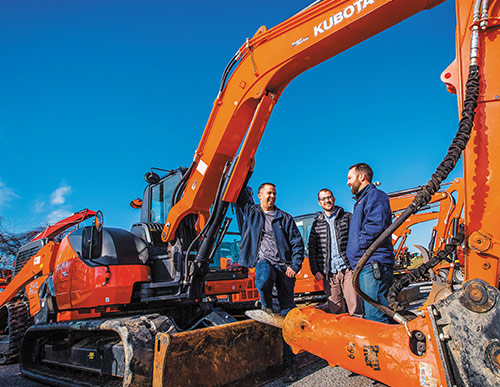
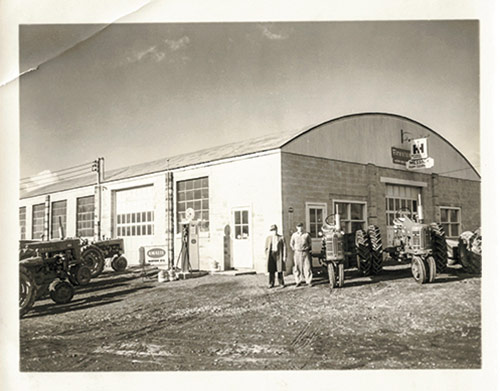 Just two years out of college, Lucas Messick ’10, an accounting major considered a new career opportunity in 2012 with the gravity of someone about to take his very last job — because he knew that was most likely the case.
Just two years out of college, Lucas Messick ’10, an accounting major considered a new career opportunity in 2012 with the gravity of someone about to take his very last job — because he knew that was most likely the case.
“I said to my wife, ‘If I take this job, this might be where we’re at for the rest of forever,’” said Messick of the accounting position at Messick’s, his family’s farming and heavy equipment dealership in Elizabethtown, Pennsylvania. “It was a big decision: Do I want to see my dad and my brothers six days a week?”
Family members working together to run multigenerational businesses have joys and challenges different than the average 9-to-5er. Through its students and its trustees, Messiah College has played a part in many family business success stories.
Lucas Messick joined his brothers Kevin ’06, who majored in engineering, and Neil ’02, a business information systems grad, along with two cousins in taking over the business from their fathers, who had taken it over from their father, Merville Messick, who founded the company in 1952. Messick’s has grown 10 to 15 percent a year for the past 10 years and now boasts 240 employees, says Neil Messick. The consistent family leadership gives the crop of current owners a steady measure of confidence despite the growing demands of a booming business.
“The trust you can have that your family is always going to be there, and they’re going to see this through just like you are,” Neil said. “That’s very comforting.”
Working from home
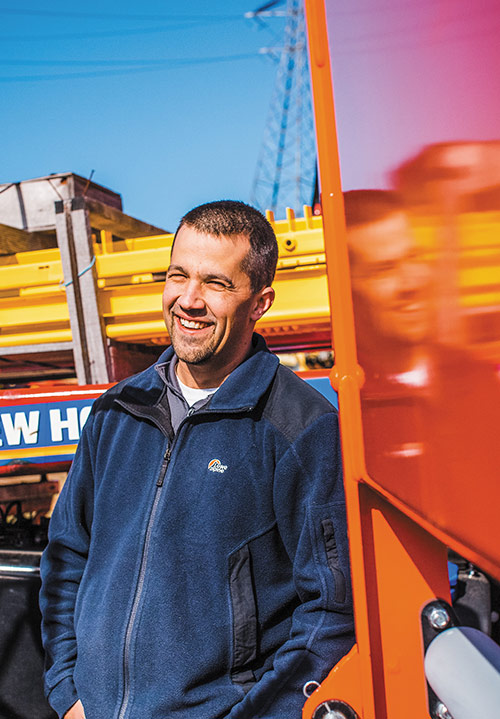 Lewisburg Builders Supply Company served as a second home for Rebekah (Griffin) Flanick ’13, a public relations major. Her grandfather purchased the Pennsylvania lumber, hardware and home center in 1956.
Lewisburg Builders Supply Company served as a second home for Rebekah (Griffin) Flanick ’13, a public relations major. Her grandfather purchased the Pennsylvania lumber, hardware and home center in 1956.
“I’ve been ‘working’ since I was 10 or so, doing jobs suitable to my age. Anything from running registers, cleaning, helping with our annual inventories,” she said.
As she grew up, Flanick’s roles in the company matured. Today, she’s the director of marketing and advertising, also assisting with sales training and hiring.
Her parents, who now run the business, instilled a strong work ethic in Flanick and her brother, a master wood craftsman.
“My mother is the CEO of the company and gives her blood, sweat and tears to make the ship sail, and it shows,” said Flanick.
Working remotely from U.S. military bases wherever her husband is stationed, she works to achieve her professional goals from afar.
“I’m a stay-at-home mom to a 1-year-old as well as an Army wife to an active-duty soldier,” she explained. “It means balancing some very late nights of staying up to get work done. Thankfully, my parents are very respectful of my desire to put being a mother first. As long as the work gets done, it’s less a matter of when and how.”
Learning the ropes
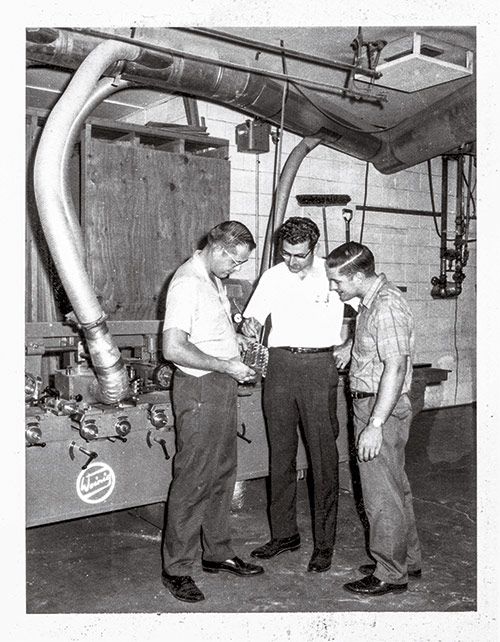 Anthony Hahn ’93, a business administration major, says he was comforted knowing that after high school a job was waiting for him at Conestoga Wood Specialties in East Earl, Pennsylvania. His father Norman and his uncle ran the custom cabinet business, where his mother did the bookkeeping.
Anthony Hahn ’93, a business administration major, says he was comforted knowing that after high school a job was waiting for him at Conestoga Wood Specialties in East Earl, Pennsylvania. His father Norman and his uncle ran the custom cabinet business, where his mother did the bookkeeping.
Today, Anthony is president and CEO of the company, which employs 1,120 in five locations across the U.S. His office sits across the street from the house where he grew up and the garage where the business began in 1964, the year he was born.
“Shortly before he died [in 2017], my dad said, ‘Anthony, I never dreamed that Conestoga would grow to what it is today,’” said Anthony, the youngest of four sons who switched offices with his father in a symbolic gesture to the employees when the leadership baton was passed.
The company’s growth in the early ’90s made Norman realize the business needed to evolve, and so did its staff. That’s when he asked Anthony, who’d been out of high school for six years, to go back to school and earn a degree from Messiah College, where the elder Hahn was a trustee.
“Having a college degree was becoming a requirement for management,” Anthony said, “so he thought it should be for family, as well.”
Making sure family members are qualified for rather than entitled to a job is an important part of succession plans. Today at Conestoga, family members must earn a college degree, work outside the family business for at least three years and get promoted within another organization before they’re invited to come on board for a suitable job opening. A position is not created for them.
After working at Conestoga for a year before college, Hahn’s son Michael ’12, a mechanical engineering major, spent five years at STV Energy Service as an engineering specialist. The younger Hahn then returned to the family business in 2017 as a corporate project engineer. He says working in a Christian environment emphasizes core values and caring for one’s employees.
“There are many times that I will receive comments from people expressing appreciation for the ability to work for or do business with Conestoga,” said Michael Hahn. “There are even people who remember my grandfather and mention how they appreciated him as an individual. It is therefore humbling and exciting to be a third-generation family member that is involved with Conestoga and to be part of an organization with this type of reputation.”
Fulfilling a calling
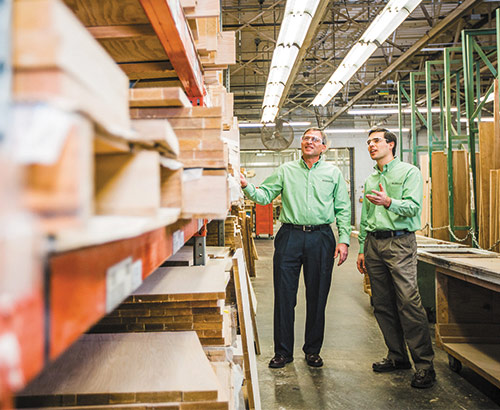 Transitioning leadership is always a challenge in business, but when past and present executives are related, it’s easier for feelings to get hurt. Chris Bingaman learned that firsthand when he became vice president of his father Max Bingaman’s lumber business, Bingaman & Son, in Kreamer, Pennsylvania, and began making changes. His father seemed upset about the changes at first, which caused Chris to question his dad’s confidence in the new leadership. But when the son dug a little deeper, he reached the root of the issue.
Transitioning leadership is always a challenge in business, but when past and present executives are related, it’s easier for feelings to get hurt. Chris Bingaman learned that firsthand when he became vice president of his father Max Bingaman’s lumber business, Bingaman & Son, in Kreamer, Pennsylvania, and began making changes. His father seemed upset about the changes at first, which caused Chris to question his dad’s confidence in the new leadership. But when the son dug a little deeper, he reached the root of the issue.
“I finally asked him and he said, ‘I just feel like all these changes you want to make are because everything I’ve done has been wrong,’” recalled Chris, who attended Messiah for one year in the mid-’70s but left school when his dad needed help with the business. “I said, ‘No, no, the changes are required because the business is growing. It’s because what you did led to growth.’”
Still, serving as the leader of a company his grandfather started in the 1930s left Chris feeling overwhelming pressure. He asked friends to pray for him. One friend sent him a pair of shoe soles inscribed with Scripture and a simple message to just fill his own shoes, not his father’s.
“That was great advice,” said Chris, whose company just celebrated its 50th year of incorporation, with gross sales around $75 million. “I can’t be my dad, I’ve got to try to be who God’s called me to be. I think over time you just understand that as a follower of Christ. I’m trusting God’s grace and guidance to do what He’s called me to do.”
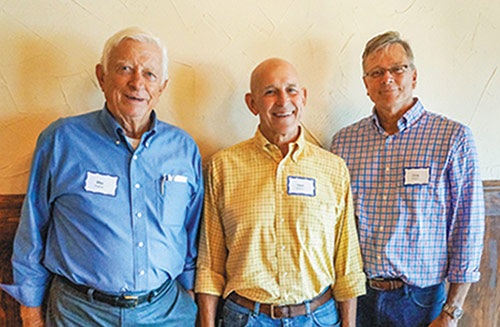 Max also leaned on the Lord plenty over the course of his long career but never more so than in the early ’90s, when Chris went through a tough battle with cancer.
Max also leaned on the Lord plenty over the course of his long career but never more so than in the early ’90s, when Chris went through a tough battle with cancer.
“For three years, we didn’t know whether he was going to live or die,” Max said.
For the long months Chris was away seeking treatment, Max came to work every day and passed his son’s empty office. “I made up my mind that if I ever could walk up here and see him sitting there in that office again, I would be exceedingly, exceedingly grateful for that privilege,” the elder Bingaman said. “And so every morning when I walk in here and he’s sitting there in that chair, I say ‘Lord, thank you.’”
Counting your blessings
Families who go through the challenges and successes of business ownership say that togetherness is better than any bottom line.
“All together, the very tight-knit, truly family-owned and operated manner in which our business is run is part and parcel to the success we have been able to achieve,” said Flanick. “And it is our deepest prayer that God continues to bless the company because of it.”